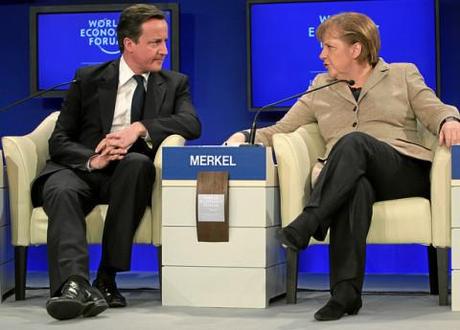
David Cameron and Angel Merkel: At odds. Photo credit: World Economic Forum, http://flic.kr/p/9hcox5
UK Prime Minister David Cameron’s veto of the proposed European Union treaty changes was greeted with roars of approval from his traditionally eurosceptic Tory party in Parliament. The prime minister insisted his hand had been forced after his demands for safeguards for the City’s financial services industry were rejected during the eurozone crisis summit. Britain is currently the only one of the 27 EU nations to reject the treaty changes.
Not everyone’s convinced he’s done the right thing: Cameron’s deputy prime minister and coalition partner Nick Clegg declined to appear in Commons during the PM’s statement on the veto; and former Labour Foreign Secretary David Miliband called it a “phantom veto”, as the changes will go ahead anyway.
So has Cameron stood up for Britain or damaged the country’s interests?
UK on the sidelines. “Far from protecting the City and Britain’s wider economic interests, Mr Cameron may have actually achieved the opposite,” wrote former Belgian Prime Minister Guy Verhofstadt in The Independent, arguing that Cameron has damaged relations with EU countries, pushed France and Germany closer together and ensured Britain is now marginalised in Europe. Verhofstadt said that the demands the PM made at the summit for the protection of the British financial services industry were entirely incompatible with the single market.
“I wasn’t prepared to agree that treaty, to take it to my Parliament in that way, and that is why I rejected signing this treaty today. The right thing for Britain. A tough decision, but the right one,” said UK Prime Minister David Cameron after wielding his veto at the eurozone crisis summit.
Business anxiety. The BBC’s Robert Peston reported that the heads of three of the UK’s largest companies had told him they were anxious over Cameron “removing himself from the negotiating table”. Peston said that there were fears that the countries outside the EU would be less interested in investing in British business if they thought the UK’s influence in the single market was weak: “The thing about multinationals is that they are citizens of the world, rather than any particular country… If they begin to see the UK as an isolated island, they will not wish to stay.”
Financial fears. According to The Wall Street Journal, British banks are concerned that far from protecting the country’s financial sector, Cameron may have jeopardised “London’s standing as a world financial center, potentially transforming the U.K.’s political isolation into an economic one”. The WSJ reported that the UK financial industry is particularly worried that the EU could force through a financial transactions tax, also called a Tobin tax, by introducing new rules that bypass current concessions.
“While Cameron tells us he made his decision to protect British business, it is British business that will lose when Britain is not involved in decisions about their largest export market,” wrote Labour Leader Ed Miliband in The Guardian.
Cameron can still negotiate. Polly Curtis rounded up the arguments on The Guardian’s Reality Check blog and concluded that the potential for further negotiation between Britain and the EU does exist: “The government could still try and get some amendments to plans for a financial transactions tax, for example.”
“Over the last years there has been very intensive co-operation between the UK and Germany, and I’m deeply convinced that this will continue,” said Peter Altmaier, chief whip of German Chancellor Angela Merkel’s CDU party, according to the BBC.
Better off without them. The Telegraph’s Janet Daley suggested there’s nothing wrong with the UK being isolated from Europe as the euro is doomed anyway: “We just have to ask ourselves: what is it exactly that we are outside of? A burning building? With only our triple-A credit rating and our competitive financial industry to console us?” According to Daley, the proposed treaty changes for tighter fiscal union in the EU will damage individual members countries: “This idea of security through uniformity is not only doomed but sinister. It will not lead to permanent peace, but to endless conflict and patent injustice.”
Forget the veto, let’s leave the EU. “The real choice now is either that we accept being governed increasingly from Brussels, or we leave the EU and negotiate a new relationship based on trade and voluntary, ad-hoc co-operation where this makes sense,” wrote Harry Phibbs on The Daily Mail’s RightMinds, insisting it’s time for a British referendum on the issue.

